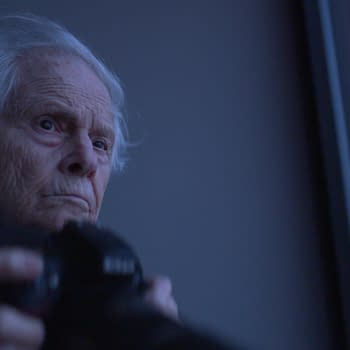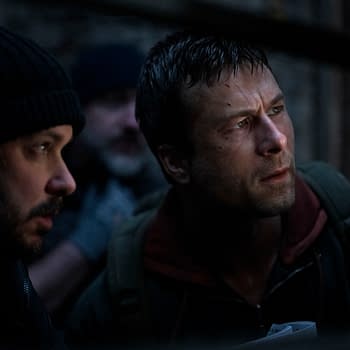Posted in: Movies, Recent Updates | Tagged: entertainment, film, indy filmmaking, production, Robin Hood Films, time management
Film Schooling: Insider Insights On Indy Filmmaking – Production And Managing Time
By Chris Hood
(This is Part Fourteen of an ongoing series to help educate aspiring filmmakers on the process of making their first film. Previous articles in this series can be found at BleedingCool.com and MovieIndustry.com)
Parts: 1, 2, 3, 4, 5, 6, 7, 8, 9, 10, 11, 12, 13
After thirteen articles imbuing priceless advice on how to prepare for the shooting of your film, I admit it's a bit tough to decide how best to first tackle guiding you through the production process. The biggest revelation I can share is that how you've prepared up to this point will totally dictate how deliciously smooth or castratingly awful the shoot itself will be. Every previous article is a roadmap of sorts, that will save you time, money and sanity before you get here to the first day of principle photography.
Of course there are still going to be plenty of mistakes to be had and you'll certainly make some of them, so just hope you can keep that to a manageable number and that the areas where you do drop the ball are correctible. The most important piece of advice I can offer while in production are: Manage Your Time Wisely.
Hear this now – there will be many disagreements, conflicts and heartaches during production, but your main adversary is time. Time is the God you have to worship endlessly for the moment you stop thinking about it, He'll smite you…and no one likes to be smitten! (actually, being smitten is a good thing, so let's go with "smote")
Every minute during production has a cash value attached to it. Every hour is costing hundreds or thousands of dollars. There is a finite amount of time to make your movie because there's a finite amount of money with which to purchase an allocation of the time you'll use. Most every day you'll be wishing you had more time because for nearly every decision you make, time will have a voice. Basically, once shooting starts, you're Time's bitch.
As we ingest the copious knowledge I'm attempting to forcibly infuse into you, we'll be touching on a few points that have come up in previous articles. Countless turkeys you hatched in your weeks of pre-production will now come home to roost. Time is a heavy boot targeting your junk. As the producer, know that it's your job to make sure it's managed as effectively as possible. In truth, this will likely fall on the shoulders of the 1st A.D., the production manager and/or production coordinator, but as you're the big cheese, all roads lead to you. (and if you're a gnome as well, all roads lead to…you get the idea…)
The reason time is so difficult to manage on a film set is that there are so very many variables. It's quite easy to say that at 2:00 we're moving from Location A to Location B and it's good to have hard deadlines and the wherewithal to stick to them, but sometimes unexpected or uncontrollable factors will mess with any and all types of planning. Early on you'll begin to see factors that are going to mess with deadlines on your project. The ones you can predict and best manage are the ones related to people.
I mentioned in an earlier posting that everyone on a film set thinks their job is most important. Because of that, there is a slight feeling of entitlement and that the rules don't necessarily apply to them. Naturally, this is most commonly found among talent. Actors and actresses will take liberties with your time, and therefore your (i.e. investors) money, for any number of reasons. Selfish people with big egos have little regard for those around them. The obtuseness of this is surprising, since what's bad for the film is inherently bad for the actor as well, but they don't seem to dwell on this basking comfortably in their shortsightedness. Actors are often the worst because they believe they are "irreplaceable" and, to some extent, they're right. Much like the actress I worked with on Dirty Dealing, which I mentioned previously, the further you are into a film, the more impossible it becomes to replace someone. Aside from unreasonable demands that may crop up is the mentality that the rules no longer apply to them since there's really nothing that can be done to them anyway (or so they think).
Actors will often be late. The lack of class, respect, discipline and professionalism is staggering, but somewhat common and you will be faced with this from time to time. If an actor shows up to set late, she gets to make-up and hair late, gets in wardrobe late and gets on set late. That can't be allowed. The production should never be waiting on talent. How do you deal with it?
The first step it to let the actor know the problem she's causing for the production. Sadly, this will rarely have an effect. People who are inconsiderate and/or unprofessional won't simply change their ways because you say "please." Now, of course, accidents happen. Alarm clocks don't go off or weren't set the night before. Cars break down. Traffic can be unexpectedly bad. I give everyone one free pass within reason. If it happens again, more serious measures need to be taken.
The second step is to adjust the call time of a person. If someone is regularly 15 minutes late, start having them report to set 30 minutes early. As call times are often staggered, this is usually pretty easy to pull off. Now there will be times when this type of action can raise suspicions, like when an actor is the only one brought to set 30 minute early as everyone else shows up together a short while later. Be creative. I've gone to a hair or make-up artist and had her "request" a little extra time on a certain actress. As you can imagine, there's a vastly different response to "We need you here 30 minutes early because hair wants some extra time with you" and "We need you here 30 minutes early because you're a selfish bitch that doesn't believe in punctuality."
Another option is "wake up calls" to the consistently tardy purveyor of douchbaggery. If you know it's going to take an actor 45 minutes to get to set, assign someone the task of calling him 60 minutes before that to be sure they're on the way. They may get irritated when they find out they're the only one getting this treatment, but you can always explain to them how they earned it. But let's be honest – they know.
And, of course, you can always assign a driver to an actor. The downside is that this feels almost like a reward for their inconsiderate nature, but you must find the best possible way to manage your time. Bigger stars will often have a driver and/or personal assistant. Whether that person is provided by you or a friend/employee of the actor directly, generally that person knows his or her job is to help keep that actor on schedule. And a few extra bucks in their pocket can add additional incentive.
When it comes to crew who can't seem to be punctual, the solution is much simpler – fire his ass. Again, a warning is fair as mistakes do happen, but like I stressed in an earlier articles, once things start to go wrong on set, they can go way wrong way quickly. Nip that shit in the bud.
If your cast and crew are (relatively) in line, you can focus on being productive with the time you have. I wish there were easy rules and guidelines for this, but in large part it comes from experience and having the right people around to manage that time. A great 1st A.D. will keep things moving and keep you on schedule as much as possible. A responsible crew will be able to stick to the deadlines they're given. A good director will understand what he can realistically get with the time he has available. Simon and Garfunkel are masters of not just thyme, but parsley and sage as well. (too obscure?)
Another piece of advice I can give on this note is that when someone wants more of this very finite commodity, make sure they have some to give back somewhere else in exchange. If the director wants another hour to finish a scene, make sure he knows he's losing an hour on a later one. Drive that home in that moment and you'll see just how important that extra hour is then.
In the final assessment, you're the producer and the time and money are all on you. You can paint your responsibilities with as broad of a brush as you'd like, but those are the two things that dictate it all. Make the right decisions and manage them both well and you might actually make a decent filmmaker.
Chris Hood is a writer, producer and director of such films as "Counterpunch" starring Danny Trejo (a Lionsgate release) and "Dirty Dealing 3D" with Michael Madsen and C. Thomas Howell. He is also owner of Robin Hood Films, a Las Vegas-based distribution company representing English language films around the world and operates a film blog at MovieIndustry.com. He's also dead sexy. (Mr. Hood denies any involvement in the creation of this mini-bio.)

















